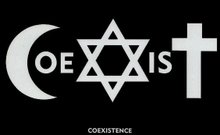Elvis Has Entered The Building
 Velvet Elvis: Repainting the Christian Faith is written by Rob Bell, pastor of Mars Hill Church in Michigan.
Velvet Elvis: Repainting the Christian Faith is written by Rob Bell, pastor of Mars Hill Church in Michigan.
Do not be fooled by the short width of this book, for inside lies a thought-provoking and daring examination of the 21st century Church, the evolution of Christian history, and how today's believer interprets scripture.
The term "Velvet Elvis" is referring to an old, worn out painting collecting dust in the author's basement and is his metaphor concerning the old, out-dated, and increasingly irrelevant MECHANICS of the Christian faith, not the faith itself, (that is a crucial distinction to understand when reading this book).
Rob Bell whole-heartedly plunges into somewhat uncharted territory (well, at least territory that is not usually vocalized publicly). With candor, whit, and humility, Bell ventures to illuminate the interpretations of scriptures throughout history, examine the past interpretations that serve as building blocks for continual growth that is essential for a living religion, and to probe the concept of "binding and loosing" prescribed in the Gospel of Matthew. Some reviews of this book insinuate that Rob Bell treads on thin ice, dangerously close to breaking through into the cold waters of heresy. This is microscopically understandable, since one must proceed with great caution when anyone advocates changing God's Word. However, an honest reading of this book will reveal that the premise is not to change God's truth into yet another form moral relativism, but to build upon the unchangeable foundational truths of Christianity that change our understanding of God's truth, in some cases, broadening it, in others, narrowing it.
The author puts it like this:
"God never changes, nor do the central truths of Christianity. But our understanding of those truths is in constant flux. Christians will always be exploring and discovering what it means to live in harmony with God and each other."
To me, anything worth reading has to be somewhat "controversial," because one of the marks of truth is indeed, controversy. Besides the stirring of constructive controversy, another much-appreciated strength of the book is that the author does NOT gloss over tough questions and touchy issues with the usual mind-numbing christian cliches or christianese jargon. It's raw. It's honest. It wrestles. It's left open to be tested and questioned.
Being the opinionated gal that you all know and love, ahem, I did not jive completely with everything in this book. However, the brilliance of Rob Bell is that he is NOT dogmatic and is NOT claiming to have all the answers. The gist is: Seek the truth for yourself and test all things that you find to be true...and false. I would recommend this book to anyone who is not afraid to break out of box, to anyone who is tired of checking their brain at the theological door, and to anyone who desires to examine the roots of their own beliefs and interpretations.














11 comments:
Our homegroup did this book, and I too loved it, even though I wasn't convinced he was 100% accurate. I liked how he asked the reader to explore and not take his word for it. Nobody in our HG thought it was to controversial, so I guess I didn't see it that way.
I don't think most people at our church would find it controversial, but there are more rigid readers that would find the notion of not having every single piece of scripture nailed down and irrefutably defined uncomfortable, to say the least. :)
i just finished it. it's my sister's and i read it in two days while staying in toccoa over a weekend. now josh and i are going to try to get through it again together.
i have read some VERY critical reviews about bell and the emerging church movement... that most associate him with.
would you put him in with that group?
the critics claim him to be a wolf in sheeps clothing... giving us what our itching ears want to hear.
i think that's a pretty relative statement though.
personally, my rebellious ears just want all the answers spelled out in black and white so i don't have to think or connect with the spirit for guidance. i'd sometimes rather read a book to tell me what the bible is saying rather than read it for myself and wrestle with what it means for my life. i know that is completely wrong and i have been struggling with giving up that desire to just be lazy. i loved his comments about this being the narrow way ...by staying in community and working these things out. my perception of the narrow way growing up, was always needing to maintain perfection, image. i was never comfortable with that, but lacked an alternative till much later in life. i don't blame that on my parents, but it's interesting that my dad finds the book pretty hard to read and could only get through the first couple chapters. but i am actually cool with that, and we've had some good discussions. i think it is a VERY controversial book as well.
thankfully i don't seem to be an option in my life these days about thinking ... as i'm continually challenged in community and by authors such as bell who are inspiring me to journey rather than claim i've arrived. (fire insurance, basically)
it was so refreshing to read something that so simply articulates what i have felt for so many years... but struggled with wondering if was okay to think that way. i don't agree with everthing either... but as you said i don't think that was his point.
it's funny i almost commented on your last review to ask if you'd read this one.:)
I have concerns with the Emergent Church Movement, too, and while people lump Rob Bell into that catagory, he doesn't classify himself as a part of it. But I am dead set against "guilt by association" anyway though. I want to judge this book based on his logic, arguments, facts, claims, and content, not on his vague associations. So, based on that, I really respect his admonishment to "test all things for yourself." Too many authors, speakers, and pastors act like questioning their views borders on blasphemy or lack of faith. So just the fact that Rob Bell leaves himself and his ideas open to criticism without negating a critic's faith, is a very good sign.
The content of the book is really hard for black and white thinkers, but the more I read the Bible and experience the realities of life, I believe there is more grey out there than most of us think. This book is a resource for situating people in a position where they have to admit God is bigger than our understanding, that He is working in ways that makes us uncomfortable, and that He is present in some of the most unlikely places and people. Just continue to question and test his ideas.
I hope that helps. :)
Oh also, always be wary of critics who engage in personal attacks (such as guilt by association, name-calling, etc,) as a means of distraction and never actually refute specific arguments with scripture and reasoning.
yeah...there's alot to sift through at times that i feel like there is no end to the process, and no point either. but i am learning slowly which places to avoid so as not to give up. it seems you can always find good christian, bible-believeing folks, on way opposites sides of alot of issues. very interesting to me. thanks for the tips.
my favorite color has always been grey.:) some of my best friends and husband included are really black and white though. i know god did that on purpose.:) makes for fun times.
Hey, I am a very black and white person and I still appreciated the book, I do think however that it would not be a book I gave to a new believer, It's a little much.
You are a black and white thinker Cat. really? I never noticed. (by the way, I appreciate black and white thinkers, because obviously there are many things that are black and white and need to be processed that way), I just think it can be hard for black and white thinkers to swallow. It's kind of how more grey thinkers, like myself, have trouble with the Pearl books. Some of the stuff in those books are too black and white for me, but I still see value in them. That's all I meant. :)
I think it's a sign of maturity to be able to see the point of both the "grey thinking" books and the "black and white books."
Knowing that both kinds of thinkers are out there and respecting each other can help us to grow in ways we never knew possible.
p.s. I am SO a black and white person but I still had trouble with the Pearl books.
That could have been the legalistc part of me...or the part that thought my black and white was right...or maybe I'm just more grey in that area.
By having trouble I mean that I struggled with some of the things they were teaching. Overall I think their way is AWESOME!
Gotta run. Bathrooms are needing to be scrubbed.
I don't know anything about how they say children should be raised because I don't have children and never read their books. However, as someone who has family members trapped in abusive and adulterous marriages, I took great issue with the Pearls insinuation that you have to stay married no matter what. And even if you have biblical grounds to leave you will pay the price "by sleeping in a cold bed for the rest of your life, unwanted." Jesus gives permission in very specific cases for divorce and I don't think any pastor, teacher, or author should take that away from desperate women with unrepentant and dangerous husbands. But again, I'm sure those books are good for women who have normal husbands and want to learn how to better love their husbands.
I liked "Velvet Elvis" fine, but I didn't love it. It wasn't earth-shattering to me in any way but I did like the stuff about Jewish history:). That was interesting. Some of the book was a little sketchy and because of that, I wouldn't recommend it to any Christian who doesn't do their own studying (or is new in the faith). Bell's teaching seemed more fluffy to me than meaty and my eyebrows went up more than once but the book was worth reading. I can't remember why, but I do remember feeling like he contradicted himself and I just sort of wrote that off as something he understood that I don't. I should probably read the book again. It's been a year since I read it the first time. I just wish he had written it in a less choppy manner. Did any one else find that difficult to read?
I know that it is entirely possible that I am wrong about a lot of things though so I still read and think and most of all pray that God will direct me into truth and help me to avoid the pitfalls of errant doctrine. I don't think my salvation depends on my doctrine, but dang-it, I just want to know the truth and live by it!!!:):):)
Post a Comment